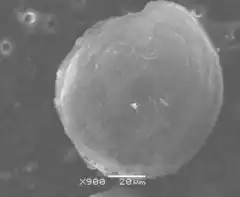Gambierdiscus toxicus
Gambierdiscus toxicus est un Alvéolé dinoflagellé benthique colonisant les coraux morts qui a été identifié pour la première fois à la fin des années 1970 aux îles Gambier (Polynésie française). La taxonomie de ce protiste principalement basée sur la forme et la disposition de ses plaques thécales, s'est avérée très complexe. Grâce aux outils moléculaires combinés à la microscopie électronique, 16 espèces sont décrites à ce jour :
- dans l'océan Pacifique, 9 espèces G. toxicus, G. yasumotoi, G. australes, G. pacificus et G. polynesiensis, dont 4 nouvellement décrites G. cheloniae et G. honu (Rarotonga, îles Cook), G. lapillus (Grande barrière de corail, Australie) et G. balechii (Mer des Célèbes, Indonésie)[1] - [2] - [3] - [4] - [5] - [6] - [7] ;
- dans les Caraïbes, 3 espèces G. belizeanus, G. carolinianus, G. ruetzleri et deux ribotypes[8] - [9] ;

| Domaine | Eukaryota |
|---|---|
| Sous-règne | Biciliata |
| Infra-règne | Alveolata |
| Embranchement | Myzozoa |
| Classe | Dinophyceae |
| Sous-classe | Peridiniphycidae |
| Ordre | Gonyaulacales |
| Famille | Goniodomataceae |
| Genre | Gambierdiscus |
Seules certaines espèces sont capables de produire des phycotoxines telles que les ciguatoxines et les maïtotoxines, l'espèce G. polynesiensis étant celle présentant la plus forte production de CTXs.
Ce dinoflagellé est responsable d'une grave intoxication nommée ciguatera. En effet, les poissons herbivores se chargent de toxines en mangeant ces algues, puis sont ingérés à leur tour par des poissons carnivores. Ainsi se produit, tout au long de la chaîne alimentaire, une accumulation de toxines dans les organes des poissons (ou biomagnification), les rendant impropres à la consommation. Les poissons au sommet de la chaîne alimentaire sont les plus toxiques.
Références
- Adachi, R.; Fukuyo, Y., « The thecal structure of a marine toxic dinoflagellate Gambierdiscus toxicus gen. and sp. nov. collected in a ciguatera-endemic area. », Bull. Jpn. Soc. Sci. Fish., , p. 45, 67–71.
- Holmes MJ, « Gambierdiscus yasumotoi sp. nov. (dinophyceae), a toxic benthic dinoflagellate from southeastern asia. », J Phycol, , p. 34: 661-668
- Chinain M, Faust M, Pauillac S., « Morphology and molecular analyses of three toxic species of Gambierdiscus (Dinophyceae): G. pacificus, sp. nov., G. australes, sp. nov., and G. polynesiensis, sp. nov. », J Phycol, , p. 35: 1282-96.
- Smith, F.K., Rhodes, L., Verma, A., Curley, B.G., Harwood, D.T., Kohli, G.S., 1, Solomona, D., Rongo, T., « A new Gambierdiscus species (Dinophyceae) from Rarotonga, Cook Islands: Gambierdiscus cheloniae sp. nov. », Harmful Algae, , p. 60:45-56
- Fraga, S., Rodríguez, F., Riobó, P., Bravo, I., « Gambierdiscus balechii sp. nov (Dinophyceae), a new benthic toxic dinoflagellate from the Celebes Sea (SW Pacific Ocean). », Harmful Algae, , p. 58, 93–105. (lire en ligne)
- Kretzschmar, A. L., Verma, A., Harwood, D. T., Hoppenrath, M. and Murray, S., « Characterization of Gambierdiscus lapillus sp. nov. (Gonyaulacales, Dinophyceae): a new toxic dinoflagellate from the Great Barrier Reef (Australia). », J Phycol, , p. 53(2):283-297
- Rhodes L., Smith, K.F., Verma, A., Curley, B.G., Harwood, D.T., Murray S., Kohli, G.S., Solomona, D., Rongo, T., Munday, R., Murray, S.A., « A new species of Gambierdiscus (Dinophyceae) from the south-west Pacific: Gambierdiscus honu sp. nov. », Harmful Algae, , p. 65: 61-70 (ISSN 1568-9883, lire en ligne)
- Faust, M.A., « Observation of sand-dwelling toxic dinoflagellates (Dinophyceae) from widely differing sites, including two new species. », J. Phycol., , p. 31:996–1003
- Litaker, R., Vandersea, M., Faust, M., Kibler, S., Chinain, M., Holmes, M., Holland, W., Tester, P., « Taxonomy of Gambierdiscus including four new species, Gambierdiscus caribaeus, Gambierdiscus carolinianus, Gambierdiscus carpenteri and Gambierdiscus ruetzleri (Gonyaulacales, Dinophyceae). », Phycologia, , p. 48(5): 344-90.
- Fraga, S., Rodrıguez, F., Caillaud, A., Diogène, J., Raho, N., Zapata, M., « Gambierdiscus excentricus sp. nov. (Dinophyceae), a benthic toxic dinoflagellate from the Canary Islands (NE Atlantic Ocean). », Harmful Algae, , p. 11: 10-22.
- Fraga, S., and Rodríguez, F., « Genus Gambierdiscus in the Canary Islands (NE Atlantic Ocean) with description of Gambierdiscus silvae sp. nov., a new potentially toxic epiphytic benthic dinoflagellate. », Protist., , p. 165:839-853 (doi: 10.1016/j.protis.2014.09.003)
- Litaker, R.W., Vandersea, M.W., Faust, M.A., Kibler, S.R., Nau, A.W., Holland, W.C., Chinain, M., Holmes, M.J., Tester, P.A., « Global distribution of ciguatera causing dinoflagellates in the genus Gambierdiscus. », Toxicon, , p. 56 (5) 711–730
Liens externes
- (fr) Référence Catalogue of Life : Gambierdiscus toxicus Adachi & Fukuyo (consulté le )
- (fr) Référence SeaLifeBase : (consulté le )
- (en) Référence AlgaeBase : espèce Gambierdiscus toxicus Adachi & Fukuyo 1979 (consulté le )
- (en) Référence World Register of Marine Species : espèce Gambierdiscus toxicus Adachi & Fukuyo, 1979 (consulté le )
- (en) Référence NCBI : Gambierdiscus toxicus (taxons inclus) (consulté le )
- (en) Référence uBio : site déclaré ici indisponible le 7 avril 2023
- (fr+en) Référence ITIS : Gambierdiscus toxicus Adachi and Fukuyo, 1979 (consulté le )